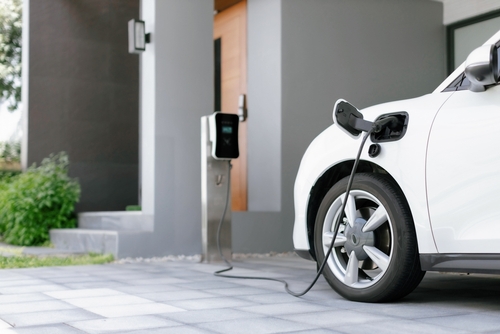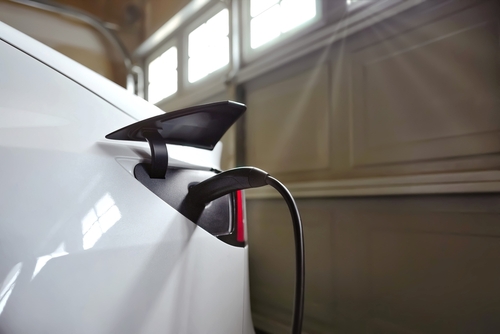Installing EV chargers at home is a crucial first step toward quick and effective charging, ensuring you’re always charged and prepared to go. Home EV charger installations are on the rise all over the world due to the ease of charging your EV in the privacy of your own home and numerous government incentives.
In this blog, the team at LB Electric digs into the realm of EV chargers and examines the technical factors, financial factors, and governmental incentives that make installing EV chargers at home an appealing option for the general public who are concerned about the environment.
Technical Aspects of Installation

To guarantee a secure, effective, and efficient charging configuration for your electric car, installing an EV charger at home necessitates a number of crucial technical considerations.
Charger Choice
The first technical choice is selecting the appropriate charger. There are two levels of EV chargers: Level 1 and Level 2. Usually included with your EV purchase, level 1 chargers work with regular 120V domestic outlets. However, they take longer to charge and only offer 3 to 8 kilometres of range each hour. In contrast, level 2 chargers work at 240V and are much quicker, offering roughly 16 to 97 km of range every hour of charging.
Electricity Capacity Evaluation
It’s important to evaluate your home’s electrical capability before installation. A Level 2 charger installation will add a significant load to your electrical panel, so you should have it inspected by an electrician to be sure it can handle it. They might need to modify the panel or put in a special circuit to accommodate the EV charger, if necessary.
Location and Mounting
It is crucial to choose the right place for the charger. In order to make installation as simple as possible, it should be adjacent to both the electricity panel and your parking spot for convenience. When installing, take into account elements like accessibility and weather protection. In accordance with the instructions from the manufacturer, mount the charger firmly.
Codes and Permits
For a safe and legal installation, adherence to local building rules and acquiring the required licenses are essential. Regulations differ from region to location, so speaking with a local electrician who is knowledgeable about the rules in your area is crucial. The installation must abide by both any applicable local laws and the Canadian Electrical Code (CEC).
Wiring and Installing
To manage the wiring and installation procedure, you must hire a professional electrician. They will guarantee proper connections, grounding, and wiring. The electrician will carefully adhere to the manufacturer’s recommendations and instructions to make sure the charger is fitted and set up appropriately.
Cost Considerations
Charger Price
A sizeable portion of the total expenditures is the price of the EV charger. The cost of chargers varies depending on the brand, the features, and the charging capacity. The purchase normally includes level 1 chargers, which frequently accompany the EV. Level 2 chargers, on the other hand, are quicker and more effective and come in a variety of price ranges, generally from a few hundred to over a thousand dollars. Additional features like Wi-Fi connectivity, app integration, or sophisticated charge management systems may affect the price.
Cost of Installation
Investing in expert installation is expensive, so keep that in mind. The intricacy of the installation, the placement of the charger, and the current electrical configuration in your home all affect how much it will cost. The cost of installation will increase if you need to alter your electrical panel or construct a load miser (aka Electrical Energy Manager) for the EV charger. The expenses typically include labour, electrical material costs, and any extra equipment required to finish the installation securely and in accordance with local regulations.
Utility Rate and Charging Costs
For financial concerns, it is critical to understand your utility rate and calculate the cost of charging your EV. The cost of charging your EV at home will directly depend on the power rate you pay. It may also be more affordable to charge your car off-peak hours because certain utility companies offer unique EV charging rates that can lower the cost of power. You may get a better understanding of the long-term cost reductions associated with an EV by taking these rates into account and estimating the monthly or yearly charging expenses.
Government Incentives

To encourage sustainability and lower greenhouse gas emissions, governments at all levels frequently offer incentives for the purchase and installation of electric cars (EVs) and EV chargers.
Federal Tax Credits
The installation of domestic EV chargers is eligible for a tax credit from the federal government. These subsidies can greatly lower the initial cost of purchasing an EV. Depending on the type of EV and its battery size, the details of these incentives may change. This financial incentive encourages people to make investments in EV charging infrastructure at their residences.
Charging Station Incentives
The federal government offers funds to support the building of EV charging stations under the Zero-Emission Vehicle Infrastructure Program (ZEVIP). This financing covers infrastructure for home chargers, business chargers, and public chargers. The goal is to hasten the installation of charging stations around the nation, improving the use and accessibility of EV charging.
Provincial and Territorial Incentives
To encourage the use of EVs and the construction of charging infrastructure, several Canadian provinces and territories each provide their own set of incentives. Additional subsidies for buying EVs, lower registration costs, toll savings, and access to high-occupancy vehicle (HOV) lanes are a few of the incentives available. The precise incentives change depending on the location.
Municipal Incentives
By providing their own incentives to promote the installation of EV chargers, several municipalities also contribute to the ecosystem of EV incentives. For people or companies wishing to install home or commercial charging stations, these incentives may include subsidies, tax advantages, or faster approval procedures.
Green Energy Programs
Programs in several provinces promote the use of renewable energy sources to power EVs. To encourage people to install solar panels or other renewable energy sources and supply their EV chargers with clean, sustainable energy, incentives might include financial assistance or price breaks.
Additional Tips
Research Charger Brands
Do extensive studies on the various charger brands, their features, and customer reviews before making an EV charger purchase. Look for a dependable and well-known brand that has the functionality you want for your unique charging needs.
Future-Proofing
Pick an EV charger that has cutting-edge capabilities like load control, Wi-Fi connectivity, and compatibility with new technologies. As the EV business develops, future-proofing your installation guarantees that your charger will be effective and relevant.
Consult with Experts
Throughout the installation procedure, always seek the counsel and help of certified electricians and experts. They can offer insightful analysis, determine the electrical capacity of your house, and make sure the installation complies with all applicable safety requirements and local ordinances.
LB Electric – Reliable & Prompt Electrical Contractors in Ottawa
Installing EV chargers in the home is a crucial first step in the campaign to adopt electric cars (EVs) and support a sustainable future. This one action not only increases convenience in your everyday activities but also significantly lowers your carbon impact. You may easily incorporate an EV charger into your living space and adopt an eco-friendly lifestyle by being aware of the technical details, financial constraints, and variety of incentives available.
Are you prepared to install EV chargers in your home and transition to electric vehicles? Please contact us at LB Electric, your dependable Ottawa-based provider of electrician services. Our knowledgeable experts have experience installing EV chargers, so you can count on a smooth setup that complies with local laws and your demands. Don’t pass up the chance to participate in building a sustainable future and receive government incentives. To strengthen your dedication to cleaner, greener mobility, get in touch with LB Electric right away.

